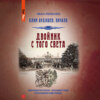Читать книгу: «Sweet Mace: A Sussex Legend of the Iron Times», страница 19
How Mace made a Promise
“I do not often exact my lover’s fees,” cried Sir Mark, kissing her passionately in spite of her struggles, while a feeling of horror half froze her, as she thought that this man must have heard the conversation with the father.
In a few moments, though, she had freed herself, and stood panting before him, longing to look back, and straining to listen to every rustle of the leaves behind her, and yet not daring so to do, lest it should draw attention to the fugitive.
“How silent you are,” he said, laughing. “A stranger would think you feared me, and not that we were so soon to be man and wife. My darling, is it not time we grew less distant?”
“Let me pass, Sir Mark!” cried Mace, hardly knowing what she did or said.
“Pass! No, little meadow-sweet. I will walk home with thee, proud and delighted to be thy champion and protector – the happiest man on earth.”
He talked on as he walked by her side, turning from time to time to gaze on her white face, as they neared the cluster of houses near the Pool, and seeming pleased that first one head, and then another, should be turned to gaze after them as they went across the little bridge and into the porch.
As soon as she could escape, Mace hurried up to her own room, where she recovered a little from the agitation, as she thought of the father, and that there was one place to which she could flee in the event of matters coming to the worst. She had to plan, too, that certain necessaries should be sent to Father Brisdone, all of which relieved her of her terrible brooding thoughts, and the feeling that she was forsaken. Helping another, and that so old a friend, was her solace, though she wept bitterly as she thought of how it was through her that he suffered.
One thought, too, now dominated over the others, and that was, had Sir Mark heard her words? If he had, the father would be seized, and she sat thinking, longing to send him warning, but afraid, for she knew that, with all his smiling openness of countenance, Sir Mark’s words that he spoke to her on their way back were true, for he had told her that he was jealous of her; that he trembled lest some one should rob him of his great joy, and that his men were compelled to be watchful; and often when she had seen a dark figure near her window at night she was sure it was not from objects of gallantry – that Janet had not been waited for, but that the house was being guarded as if under military rule.
It was with a sense of relief then that she saw Sir Mark’s departure for London the next day, even though he told her, as he held her hand, that on his return he should claim it as his own.
There would probably be a fortnight, in which time a change might come, as Master Peasegood had said, for Sir Mark might never be permitted to return.
The freedom from his presence, though, brought little more liberty, for that very afternoon a quiet, smooth-faced, smiling man in clerical garb called at the Pool-house, introducing himself as the minister who was temporarily to hold the cure of souls.
Mace shrank from him with fear and distrust, for in him she knew she was looking upon Sir Mark’s creature, a spy upon her actions, and one who was to bind her fast to him with chains that could never be undone.
She contrived to carry various articles down to Croftly’s cottage, but in doing that she found that she was watched, some or other of Sir Mark’s men loitering about, apparently enjoying their idleness and freedom from their master’s eye; while she soon awoke to the fact that even her visits to the gardens were noted, and that Janet, her maid, had been bought over to the other side.
She tried one more passionate appeal to her father, but he would not hear her; and after this she felt that she was thrown upon herself to make some desperate resolve, either to flee to Father Brisdone, or take a more terrible step, one which during the past few days she had learned to look upon almost without a shudder.
The time seemed winged by magic as it glided by, and, trembling and excited, she knew that the hour had nearly come for Sir Mark’s return. Twice over messengers had arrived from him, in each case laden with presents, and bearing a letter full of words meant to be tender, but which excited her disgust. She had had to listen, also, to the fulsome adulation of Master Peasegood’s successor, who, to her horror, contrived to get himself asked by the founder to stay at the house, where he became a spy and an incubus of which the poor girl seemed to be never rid.
At length a last messenger arrived, bearing a fresh order to the founder, and requesting him to proceed with it at once, at the same time announcing Sir Mark’s arrival on the morrow.
That night Mace sat at her window debating within herself as to what she should do. A last appeal to her father had been so met that she felt desperate, and a hair’s pull one way or the other would have been sufficient to draw her aside.
The question she asked herself was, whether she should flee to Father Brisdone now, or wait until the eve of the wedding, and she decided for the latter course, as, sobbing bitterly, she told herself there was escape for her still if the father had not been seized.
The night was dark with the darkness of autumn, and as she sat at the open window, with her cheek upon her hand, she gazed out at the dark Pool and listened to the murmur of the falling waters as they plashed musically amidst the stones and piles.
Suddenly, in the midst of her despairing thoughts, her hand dropped on the window-sill, and her eyes dilated as she gazed before her at the broad green bank across the race, where four points of light shone out diamond-wise as in the happy days of her young love.
“Gil,” she cried below her breath, and her heart beat painfully as she gazed intently at the lights, which faded as quickly as they had appeared.
Was it fancy – a trick, or some treachery? There were no glow-worms now. It was long past the time when they shed their tiny lights, and the appearance, if it were not fancy, could only be some accidental resemblance which she had magnified in her excited state.
It was nothing, she said, as a feeling of misery came over her, and the tears rose to her eyes as she wondered where Gil could be, and whether he thought of her at that moment, when there was a slight rustle below, and she reached out of the window, as her name was uttered in a low, deep voice which she could not mistake.
“Mace!”
“Gil!”
For answer a foot was placed upon the sill below. He sprang, and caught the mullion of her window, drew himself up and clung there, with both hands, as she flung her arms round his neck, and laid her face against his cheek.
They were moments of ecstasy mingled with grief and pain, as in her delight at Gil’s return Mace began to whisper to him of her terrible position.
“I know all, sweet,” he whispered back. “But hush, speak beneath your breath. You are watched at every turn, and it was only by setting two of my men to lead the spies upon a false scent that I could get to the window. Oh, my darling, I could die now after this joyful meeting. I have not doubted of thy love – not much; but I did not know how thou mightest be forced.”
“Oh! Gil, Gil, I am most miserable,” she moaned.
“I know it, sweet. Father Brisdone has told me all. But, there, you will listen to me now. Mace, dearest, you will not wed this man?”
“Gil, I was thinking when you came to-night I’d make the Pool my wedding-bed.”
“My own!” he whispered, as he longed to press her in his arms – the arms that clung painfully to the window-sill to keep his face on a level with hers.
“I was so miserable I wished myself dead.”
“But now?” he asked.
“Now,” she said, forgetting all timidity in her joy, as she clung more closely to him, “Now I wish to live.”
“And you will go with me?”
“What? leave my home – my father?” she said, half in amaze that he should propose such a thing, and with all a woman’s inconsistency, though so few minutes before she had thought of fleeing to Father Brisdone to seek a home abroad.
“Yes, when it is no longer a home to thee, sweet. Give me the name of husband, Mace, my own old love. I have but moments to say it to thee. Come with me now from this window. I have half a dozen men waiting. Four shall help to guard you to our hiding-place while two go to the old iron-pits and fetch thence Father Brisdone. He shall wed us at once. Or we will away to my boat in the little river and go down to my ship, where let even the King seek thee if he dare.”
“Oh, Gil – dear Gil, I cannot!” she faltered.
“Quick,” he whispered. “Hold me tightly, sweet, for my arms are failing. Look here, Janet shall come if thou wilt.”
“Nay, nay, she is false.”
“Then come without her, sweet. Come, and be my own wife, and let us laugh at this intruder, who would rob us both of a happy life.”
“No, no, no!” she faltered, as she clung to him. “I cannot come – I cannot come.”
“You do not trust me,” he said.
“Oh! hush, hush, Gil!” she moaned. “I do trust you, and love you with all my heart. I will die sooner than that man shall clasp me as his wife, but I cannot, cannot flee my home like this.”
“Yes, yes, dearest, quick, you must decide,” he whispered, as a faint chirp was heard.
“I cannot, Gil. My father – my poor father, I cannot leave him.”
“Mace, dearest, you torture me and yourself. You will come.”
“Nay, nay, I cannot.”
“What! Will you stay to be this man’s wife?”
“No! Sooner death,” she cried. “He may not return.”
“He is on his way.”
“Oh, no, no,” she whispered, shuddering. “I could not be his wife. He may not come – a thousand things may happen. Oh, Gil, Gil, do not tempt me to do wrong.”
“Nay, nay, I’ll not tempt thee, sweet. ’Tis no temptation to say, ‘Be my wife.’ Is it so sad a fate?”
“Gil – husband – thy wife or death’s!” she sobbed, as she passionately kissed his sunburned face.
“Then you will come, sweet!” he cried. “Quick, thy cloak and hood.”
“Nay, Gil, dearest Gil, I cannot leave.”
“Mace!”
“Do not reproach me,” she said, sadly. “Gil, dear Gil, I love thee with all my heart, but I could not flee from here while hope remained.”
“And does it remain here?” he said, bitterly.
“Yes, dearest,” she whispered. “My father may repent; Sir Mark may never return. While there is either of those to cling to, I could not go.”
“But, if they were gone, would you come? Tell me quickly.”
There was a dead silence, during which the chirp, as of a bird, was once more heard.
“There is something wrong, sweet, and I must go; but tell me, were both those hopes gone, would you come?”
Again there was silence, and then once more the chirp of the bird.
“Gil,” whispered Mace, with her lips to his ear, “I cannot leave my father while there is hope. If this fails me, on the eve of my wedding-day, come, and I will flee with thee to the great world’s end.”
“Seal it,” he whispered. “Gil!”
“Seal thy promise, sweet,” he whispered. “My arms fail me; I cannot draw thee to my breast. Kiss me, sweet wife, for my wife thou art.”
Her lips slowly lowered themselves to his, rested there for long, and then were raised, as a thrill of joy shot through the young man’s breast.
“On the eve of the day appointed for the wedding, then, I will be here, to take thee away. Father Brisdone shall be on board my ship, the boat lie waiting, and there shall be good men and true to protect thee, love. You will not fail?”
“I will not fail,” she whispered.
“There goes one hope,” he said, as lights shone through the trees on the track beside the Pool. “Sir Mark has come.”
Mace uttered a faint cry.
“Nay, love, that should be a cry of joy,” he whispered. “I go hence happy, for the prize is mine.”
Her arms relaxed, and he dropped from the window, and stole cautiously away; but on every hand he found that some one was on the watch, and that Sir Mark’s people, who were more able than he had expected, were at every turn.
They had not seen him come, but partly from suspicion, partly because they half expected that the announcement of Sir Mark’s return upon the following night might be merely a ruse to throw them off their guard, they were particularly watchful; and, as they had anticipated, so it happened, for there was their leader at the gate.
A few blows and a struggle, and Gil could easily have escaped, but that would have interfered with his plans; and hence he was doubly cautious, the result being that just as the horsemen bearing lights reached the house, Gil had crept back and crouched beneath his mistress’s window, unable to get unseen away.
“Gil,” she whispered.
“I am here, sweet. They will see me if you stay. Go in, and close thy casement.”
“Nay, nay,” she whispered, agitatedly. “You will be taken – there will be blood shed. Come – quick – in here till they are gone.”
With a bound Gil reached the heavy window-sill, and drew himself up, got one arm over, then with a slight struggle he was half in, then leaped lightly down, and caught Mace to his panting breast.
“Hush! for heaven’s sake, hush!” she whispered as she clung to him, “you might be heard.”
“And if I were,” he said fondly, “I should have blurred my darling’s fame. Mace, sweet wife, that I love thee thou shalt have no doubt. Heaven bless thee, child. Good night.”
Before she could speak he had placed one foot on the sill and leaped out on to the grass, coming down so lightly that as she darted to the window she hardly heard his footfalls. There was a slight rustle though on her left, which must have been he; and then as she drew back there was the sound of low voices talking, and she became aware that they were those of her father and Sir Mark.
She shrank away from the window with a shiver, for the voice of Sir Mark sounded hateful to her; but fear lest her lover should be heard drew her back, and she stood listening, but heard no sound to cause her dread.
Once more there was the chirp as of a bird, and then came an answering chirp as from off the water, after which all was silent, and she closed her window to sit down and wonder how Gil had produced those tiny sparks of light, and then she knelt down and laid her cheek against her bed as she prayed with all her heart for forgiveness if she were wrong in feeling so joyous – so glad of soul that her lover had returned.
For there was a delicious sense of ecstasy – of freedom from all pain – pervading her. She was safe from Sir Mark and his machinations. He might take away Master Peasegood and Father Brisdone, but Gil he dared not touch; and she closed her eyes and sighed content as she thought of her stout, brave lover – so strong, so manly, and so true.
Was it the same life, she asked herself, that she was living a few hours ago? It seemed impossible; and she rose at length so refreshed and calm that she was ready enough to answer when there was a step on the stairs, and her father’s voice speaking.
“Art abed, lass?” he cried.
“No, father.”
“Then come down. Sir Mark would see thee and show thee the presents he has brought from London town.”
Mace hesitated for a few moments, and, had it been the night before, she would have refused to go. This night she felt so at peace within herself that she was ready enough, and went down to read in the eyes of both that they were ignorant of Gil’s return, though she repented afterwards, and felt that she was playing a double part, as she listened to Sir Mark’s adulation, and saw the rich presents he had purchased for his bride.
It was while she was listening to his words that she suddenly recollected the necklace of pearls which she had scattered about the room where they were seated, and wondered where they had gone, for she had thought of them no more.
At last, at a very late hour for the simple country-place, she was able to retire, and when she did, and received her father’s customary kiss, the words he uttered we’re few but they shot through her like a pang.
For they were words of thanks for her less reserved demeanour towards Sir Mark; and, as the poor girl ascended once more to her room, it was with the feeling strong upon her that the second hope to which she had clung had just been swept away.
How Tom Croftly spoke his Mind
It was soon known in Roehurst that Captain Culverin had returned from his voyage, and Sir Mark ground his teeth with rage as he heard the news.
“The more need to get the matter over,” he said to himself; and he had at once a long interview with the founder, one which set him more at ease, for it was decided then and there that the wedding should he that day week, and Mace was summoned to hear her fate.
She heard it without a word, and from that day forward went about the house like one in a dream, but with a strange feeling of excitement ever growing in her brain.
Wedding clothes lay about her room, and presents, but she hardly glanced at them. At one of her interviews with Sir Mark she had begged that she might be left much alone, and to her great relief this was accorded to her, and she waited for the eventful eve.
She longed to visit Father Brisdone at his hiding-place in the old ironstone pit, but she dared not go, for whenever she set foot beyond the scattered houses she found either Sir Mark or a couple of his men following upon her track. She had this consolation, however, that Gil was evidently in communication with the father, for he had promised to have him on board.
At first she was all excitement to know whether Sir Mark had heard her speaking to him; but she felt sure at last that this had not been so, and so she waited.
Two or three times over her heart was in a flutter, for there were well-known voices about the place, as Gil’s men arrived escorting some dozens of the country-carts chartered to bear to the foundry-works load after load of dirty-looking saltpetre bags, and sacks of pure, pale yellow stone.
These were dangerous times, for all were well-armed, and there was risk enough of encounters between the sailors and Sir Mark’s men, for the former gazed with jealous eyes at the position taken by the latter amongst their old friends; while the latter, who knew of the treatment of two of their companions, longed for an open quarrel and a fight.
But the orders were strict on both sides, Gil making Wat Kilby scowl as he gave the most stern commands as to the behaviour of the men when in the little village; and so, day after day, loads and loads of the special commodities were landed and carried away, and Gil made no effort to see his love or even speak.
Mace asked her trembling heart whether Gil would know which was the wedding eve, as if he would not be sure; and so great was her desire to hear of the condition of Father Brisdone that she daily made a journey to Tom Croftly’s cottage, where the news she heard was always good; and the father sent her messages to be of good cheer, for he was safe.
These visits seemed to puzzle the followers of Sir Mark, who himself had his suspicions that they were made by appointment, and that she here made rendezvous with Gil; but following her one day, the most he saw was a small basket of provisions and a little flask of wine, all of which he set down to charity, and walked back with her quite content.
The unloading of Gil’s ship continued rapidly, and the followers of Sir Mark heard one or two mysterious communications about the strange processions that sometimes were seen in out-of-the-way parts at night, but their orders were to keep close to the Pool-house, and no expeditions were made to see what the processions meant.
In short, there was a lull in the little hamlet – the calm that precedes a storm – and women whispered that Mother Goodhugh had been foretelling that the time of evil for the house of Cobbe was close at hand.
Sir Mark seemed to be passing his time in busily superintending the despatch of the last piece that had been finished, after careful proof, and then in idling about the woods, or rowing upon the Pool, while the preparations for the wedding still went on.
Once or twice he occupied himself with shooting the wild fowl with arquebus or cross-bow, but all the same his eyes and ears were attent to every change.
Now that the news must have reached the Moat, he studiously avoided visiting there, for he half-laughingly wondered what Anne Beckley would say.
Jeremiah Cobbe was of opinion that his intended son-in-law was trying to make friends with all the people about the place, so frequent were his visits from cot to cot; but this was not so, for he was busy trying to learn all he could about Gil’s whereabouts and habits; an inquisition in which he was aided by Master Tarpling, the temporary resident parson; but the total of their knowledge when added up amounted to nil.
Once or twice did the founder hesitate as to the course he was pursuing, but in his business encounters with Gil he found him calm and stern, and it struck him that Mace had of late grown resigned; so he let matters drift, fully aware though he was that Sir Mark would now have forced him to keep to his word should he have shown any disposition to draw back.
“He’ll make her a good husband,” he said to himself. “She don’t fancy it, perhaps, at first; but a father must be the best judge of what is for his child’s happiness.”
He was down at one of his powder-sheds, busying himself, and thinking that the Pool-house would soon be no longer the same, when he came upon Croftly, who, on the strength of his old service, said what he pleased.
“Oh, look here, Tom,” said the founder, “Thursday’s to be the wedding-day; you ought to set the men to work getting ready something in honour of the event. It’s a busy time, but I shall not take any notice if some of you stop to rig up a sort of arch.”
“Rig up!” said Tom Crofty. “Hadn’t you better ask some of the Captain’s men? It’s more in their way.”
“No, no,” said the founder, hastily. “Make an arch of green boughs and flowers, and that sort of thing. You know better than I do; go up to the village and bid the men get the case of viols, and let there be a dance – the girls will be pleased. Tell the men they shall have their shilling and plenty of ale; and you can get some powder – a keg of coarse black – and the two little old guns, and fire ’em off. You can have what wood you like, too, for a bonfire at night. Do the thing well, my lad, and take a holiday all of you. I’ll find the ale.”
Tom Croftly took off his cap, and wiped his grimy brow with a blacker hand, as he seated himself on the bottom of an empty keg.
“We had a girt meeting ’bout it in the ’ood last night, master,” said Croftly; “and talked it all over.”
“Oh, you did?” said the founder, looking pleased. “Well, and what did you settle?”
“First find foremost, master, we sattled that we’d muffle the three bells up in the tower o’ the church.”
“Why, it’s two miles away, man, and the sound wouldn’t hardly be heard here.”
“And then we’d toll ’em all day long.”
“Toll them?” cried the founder.
“Ay, master, for it be like to us as if young mistress had been put in her grave.”
“Nonsense, my lad. She’ll come back sometimes. And it’s a happy day for her.”
“Happy, eh, master?” said Croftly roughly. “Look here, you asked for this, so you may as well have it slap i’ th’ mooth. I talked to the boys, and they talked to me; and at last of all they, swore as they’d be damned, every man Jack of ’em, if they didn’t treat the whole thing as a fun’ral, and that, if any of Sir Mark’s chaps tried to get up an ale shouting, they’d shove ’em in the Pool.”
“But you musn’t take it like that, Tom,” cried the founder. “It’s very good of the lads to take on so about losing their young mistress, but you must rejoice. It’s to be a happy day.”
“She looks like it, master,” cried Tom. “Why her face be terrifying. Where be her bright sperrits, and her sparkling eyes? Don’t you make a mistake about it, master. We don’t take on about losing her, none of us, and we’d half bust every old gun on the place and raise such a girt bonfire as would set the country alight, if she was going to wed the man of her choice. But this gay fly-golding ladybird chap fro’ London! Ah, master, you be doing wrong, and that be what we all say.”
“You, Tom Croftly,” roared the founder, angrily, as he writhed beneath the lash of his man’s words, “how dare you speak to me like that?”
“Cause it be right,” said Croftly, stoutly. “Haven’t she and the captain been like two lovers ever since they was little children, and sent my heart in my mouth to see ’em playing so nigh the edge of the race?”
“I will not listen to such insolence,” cried the founder. “You, Tom Croftly, come for your wage on Saturday night, and give up the cottage the week after.”
“And maybe you’ll put William Goodley in my place, eh?” said the foreman.
“Maybe I shall,” cried the founder. “You ungrateful rascal!”
“Nay,” said the foreman, “you need not trouble yourself, mas’ Bill Goodley would not step into my shoes, nor another man in the place. And, just to show as I beant ungrateful as you say, I’ll stop on.”
“Stop on!” roared the founder. “Ay, stop on. Haven’t you just took another good order? Haven’t you got all that ’ood ready for the colliers; and haven’t you just got in a shipload of sulphur and Chinese salt? Lookye here, mas’, you don’t know, I s’pose, that if I left here every man and boy would go as well. No, master, we beant ungrateful, none of us; but we don’t like to see our young mistress sold, and him as should have had her thrown over.”
“And pray who is that?” cried the founder.
“Captain Culverin, mas’; that be the man she meant to have.”
“A wild adventurer – a man who murdered that wretch Churr.”
“Nay, master, there beant a man of us here who thinks that he did,” said the workman, sturdily; “and if Captain Gil was here you wouldn’t say it to he.”
“I am here, Tom Croftly,” said Gil, stepping into the big powder-shed, “and I thank you and your fellows for your good opinion. But take no notice of this. Master Cobbe here does not believe what he said.”
“But I do,” cried the founder, furiously.
“Tom Croftly,” said Gil, quietly, but with a flush in his cheek, “go, and leave me with Master Cobbe here. I want to talk with him.”
“All right, captain!” said the workman. “Bah!” he added to himself, “if he be’d the lad I thought him, he’d make no more ado but upset the whole of this London trade, and carry young mistress off. I would.”
“Now, Gil Carr,” cried the founder, as soon as they were alone. “We’ve done our business. You’ve delivered all your cargo that I want, and you’ve been paid your money. Wouldn’t it have been more decent if you had kept away?”
“Perhaps so, Master Cobbe; but there are times when a man feels that he must speak. But, first of all, why do you rake up that wretched story about Abel Churr?”
“Because I believe it,” cried the founder, angrily.
“Nay, you do not. You know I am innocent, or I should not dare to come to you now, and ask you by all you hold dear to give up this wretched business.”
“What wretched business?” cried the founder.
“I mean this proposed marriage. Listen to me, Master Cobbe. You have known me from a boy. I have been wayward and rough, perhaps, but fairly honest, for my love for Mace has kept me a better man than I should have been.”
“What does all this mean, Gil Carr?”
“It means, sir, that I make my last appeal to you before it is too late. I love Mace dearly. Give up this wedding and wait a year – two years – any time you will, till you are satisfied I am innocent of the death of Abel Churr, and then give me your consent. Don’t condemn us both to a life of wretchedness and pain.”
Gil had made his appeal at the wrong time. No matter when he had come, he would have met with a stern refusal; but now, when the founder was irritated beyond measure to find the echo of his own feelings in the breast of his very workmen, who, with true British sturdiness, refused to a man to take part in what they looked upon as the selling of his child, he was unable to contain himself, and the pent-up anger came pouring forth.
“Go!” he cried, white with rage, as he pointed to the entry. “Go, ere I’m mad enough to strike. Thou hast come now to try and breed fresh dissension – to try and raise my poor, foolish child in rebellion against me. I am not a man of blood, but, look you, your presence near my house from now till when this wedding has taken place will be the signal for my people, or those of Sir Mark, to use force.”
“But you will not let the wedding take place, Master Cobbe? For all our sakes, pause in time.”
“In time!” cried the founder; “what do you mean? There, no more.”
As he spoke he turned and hurried out of the powder-shed, and past two or three more, to enter at last one of the stone buildings, where the casting was carried on; but Gil stuck to his heels, following him closely without noticing Sir Mark, who, on catching sight of him, raised a finger as a signal to one of his men.
“You will not sell poor Mace like this,” cried Gil, as the founder turned upon him as if at bay. “Master Cobbe, for both our sakes, pause while there is yet time.”
“Out upon thee, Gil Carr; thou maddenest me!” cried the founder. “Yet time? What do you mean by speaking to me like this? Am I not my own master?”
“Yes,” replied Gil, humbly; “and this is why I appeal.”
“Why you rebel against me, you should say,” cried the founder, passionately. “What am I to understand that you mean by ‘yet time’?”
“I mean before it is too late,” said Gil, speaking humbly and imploringly as he forced himself into making this last appeal, before venturing on an act that was repugnant to him, and which on calmer consideration he would have avoided for Mace’s sake.
“Gil Carr!” cried the founder, furiously, “go thy way, and let me go mine. I will not be dictated to by the man who has come like a blight upon my threshold. Like a treacherous adder, thou hast stung the hand that warmed thee back to life. Coward – villain – thou could’st do nothing better than set thy snares to trap my weak child. Now go, or – ”
He raised his hand and dropped it again.
“For heaven’s sake, listen to me!” cried Gil, excitedly. “Master Cobbe, I would be an honourable gentleman for my father’s sake, to thee and thine, but you drive me to despair.”
























